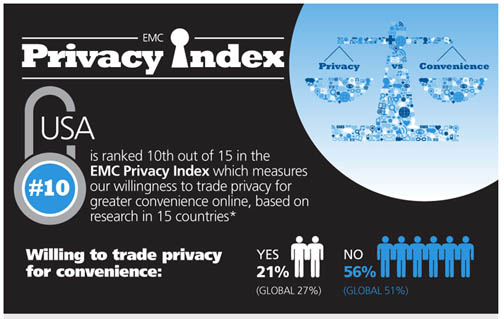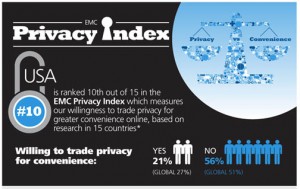Global Internet privacy study reveals conflicting views

 Consumer viewpoints on online privacy vary widely by geography and the type of activity engaged in while surfing the Web, a recently released study by EMC Corporation concluded.
Consumer viewpoints on online privacy vary widely by geography and the type of activity engaged in while surfing the Web, a recently released study by EMC Corporation concluded.
The findings of the EMC Privacy Index, a global study assessing consumer attitudes that spans 15 countries and 15,000 consumers, explores how consumers worldwide view their online privacy rights and measures willingness to forfeit the benefits and conveniences of the connected world for the assurances of privacy. Specific results for Puerto Rico were not available.
According to the study’s findings, 91 percent of respondents value the benefit of “easier access to information and knowledge” that digital technology affords. Only 27 percent said they are willing to trade some privacy for greater convenience and ease online. Meanwhile, 41 percent believe government is committed to protecting their privacy, while 81 percent expect privacy to erode over the next five years — 59 percent said they have less privacy than a year ago.
Ultimately, the study’s findings concluded “people want benefits of technology without sacrificing privacy.”
The index produced three privacy paradoxes, each with implications for consumers, businesses and technology providers:
- “We Want it All” Paradox: Consumers said they want all conveniences and benefits of digital technology, yet said they are unwilling to trade privacy to get them
- “Take No Action” Paradox: Although privacy risks directly impact many consumers, most said they take virtually no special action to protect their privacy — instead placing the responsibility on those handling their information, such as government and businesses
- “Social Sharing” Paradox: Users of social media sites claimed they value privacy, yet they said they freely share large quantities of personal data — despite expressing a lack of confidence and trust in those institutions to protect that information
The EMC Privacy Index confirms people behave differently depending on the type of activity, which can be categorized with a number of online personas (or “Me’s”), each with different attitudes towards privacy. The six personas evaluated include:
- Social Me – interaction with social media sites, email programs, text/SMS and other communications services
- Financial Me – interaction with banks and other financial institutions
- Citizen Me – interaction with government institutions
- Medical Me – interaction with doctors, medical institutions and health insurers
- Employee Me – interaction with employment-related systems and Web sites
- Consumer Me – interaction with online stores
“The data captured in the EMC Privacy Index gives a fascinating view into the attitudes of global consumers and validates a fundamental point — respecting privacy and safeguarding data is a core value that should be shared by businesses, governments and individuals to enable a more trusted ecosystem,” said Michael Kaiser, executive director of the National Cyber Security Alliance
“If organizations are transparent and accountable for their information management practices, individuals will be able to better manage their digital lives consistent with how they want to share information about themselves,” he said.
Finally, the study’s findings provided insight for consumers, businesses and technology providers.
For consumers, it reinforced the need to increase their awareness of privacy issues and to take personal action to protect their own privacy.
For businesses, the imperative is to understand the range of customer perception. Winners and losers will be determined by those businesses that demonstrate the most relevant and practical privacy practices for their customers. The more evident it is that a business is committed to privacy protection, the more likely it will attract and increase levels of consumer engagement, EMC said.
Critical to helping businesses deliver on their commitment to privacy protection are technology providers, “which need to find ways to improve privacy across their offerings without compromising user experience, performance or capability.”












